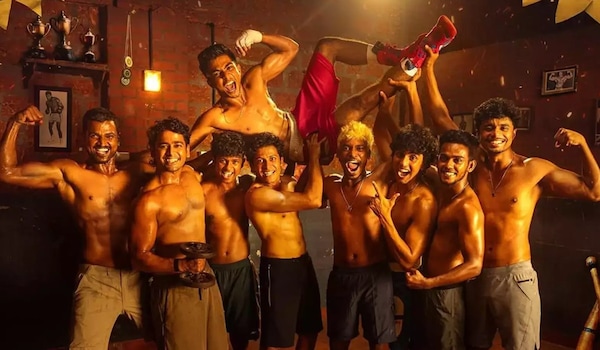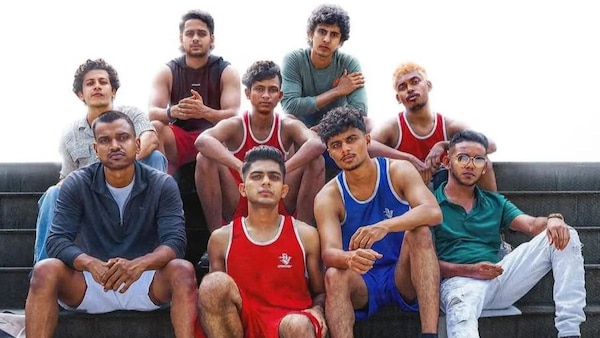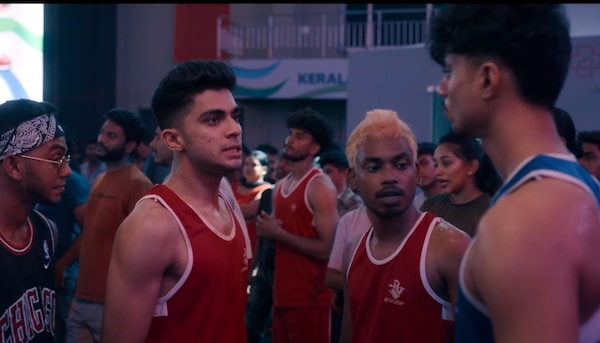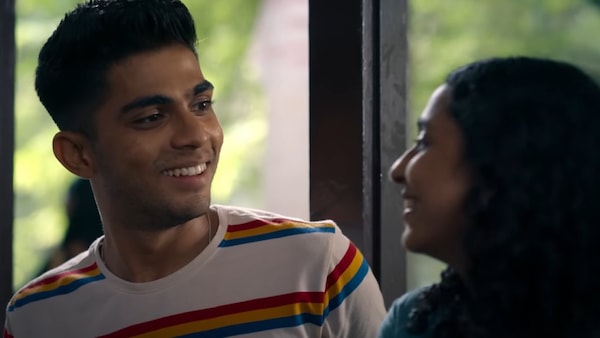Alappuzha Gymkhana Boxes With Tropes — And Wins
Khalid Rahman's Alappuzha Gymkhana upends typical sports film tropes — the virtuous underdog, one-note villains, formulaic mentorship, and predictable romance — moving beyond familiar archetypes.

Promo poster for Alappuzha Gymkhana
Last Updated: 08.40 AM, Apr 29, 2025
JOJO JOHNSON (Naslen Gafoor), the protagonist of Khalid Rahman’s Alappuzha Gymkhana, is your average, relatable teen. The one who takes his failures lightly, and in the same vein, sits down to fix them. So, when his plus-two results are announced, while he is low-key elated that his friends have also failed like him, Jojo devises a plan to leverage the sports quota for college admission. But even there, his dismal record in sports never hinders his plans. There is a scene in which Jojo is brainstorming with his friends regarding the “sport” they should pick, and Jojo picks boxing. That choice, driven by its strong communal bonds, reveals a deeper aspect of his personality — an appreciation for camaraderie and a willingness to surround himself with a supportive network. That also explains his inherent team-oriented nature and how he prioritises collective spirit and shared experiences over individual pursuits.
Khalid Rahman takes on the sports comedy genre in his fifth directorial, Alappuzha Gymkhana, skillfully flipping conventions on their head, much like his previous films. The film personifies almost all of Rahman’s distinctive storytelling style, marked by a rejection of traditional heroism. Not just that, he also weaves a narrative that thoughtfully develops every key character.

The conventional sports narrative is casually dismantled in Alappuzha Gymkhana, thereby presenting a refreshingly authentic portrayal of boxing. At its core, the sports serve as a backdrop for exploring camaraderie and team spirit among a bunch of quirky, ordinary boys who never take themselves seriously. By sidestepping the typical triumphalism and grandstanding one is so used to being associated with such a genre, the film offers a more grounded take on the transformative power of sports, one that emphasises the value of relationships and shared experiences over the relentless pursuit of victory.
Take the portions featuring Jojo and his friends' initiation into the sport; it’s very understated, thereby imbuing the sport with a sense of effortless accessibility. The tone is casual and witty, stripping away the usual grandeur associated with sports films. So, in theory, rather than a dramatic pursuit, boxing is reimagined as a natural extension of Jojo and his friends' lives. This method not just humanises the sport, but keeps the audience invested in their genuine, unpolished journey.

The narrative cleverly avoids one-dimensional adversaries, opting for complexity instead. The creative touches, such as the lively ring introductions, injecting local flavour and humour, were a charming move, underscoring the film’s ability to balance heart and humour. Even their coach, Antony Joshua (Lukman Avaran), is complex, defying sports movie stereotypes. Beneath his gruff exterior is a vulnerable individual who identifies with his team. And the scene where he is flaunting his credentials to impress the doctor at the ring not just adds a nuanced layer to his character, but also highlights the film’s emphasis on character detailing.
Interestingly, even while presenting boxing without grandness, Khalid’s attention to detail and a deeper understanding of the sport are remarkable. The narrative captures the techniques, training, strategy, physicality and mental aspects with subtlety and authenticity.
Along with Jojo, each team member brings their unique personality to the forefront—Deepak’s gentleness contrasts with his sharp technique, Shifas Ahammed is charmingly flirtatious, while Shifas surprises you with his unexpected depth.

Even amidst overwhelming male bonding. Khalid's most striking subversion lies in the portrayal of Jojo's vulnerability as he hesitantly navigates intimacy. When his partner (Nanda Nishanth) playfully suggests different kissing techniques, Jojo clams up and beats a hasty retreat, even prompting his partner to break up with him. By depicting a young man who feels overwhelmed by traditional masculine expectations, the film presents a genuine and realistic depiction of male emotions. Given the cinematic landscape’s historical tendency to idolise masculinity and stigmatise vulnerability, this moment is groundbreaking in contemporary cinema. Equally disarming is the subtlety with which Jojo's childhood friend gently alleviates his anxiety, flipping the script on conventional cinematic tropes. Also, the fact that Rahman avoids formulaic romantic entanglements highlights his narrative unpredictability.
Though the prime focus of the narrative is on male bonding, Khalid carefully portrays women with nuance. So you have a young, promising boxer in Natasha (Anagha Maya Ravi) who is assured and indifferent to Jojo’s attention. There is also a nice twist in one of the most “heroic” moments, featuring Natasha’s ring performance, exuding swag, leaving Jojo awestruck.

Considering the overflow of traditional narratives centred around the male ego, Alappuzha Gymkhana portrays rejection with honesty and sensitivity. From Jojo struggling in the ring, facing romantic rejection, to his friends laughing off defeat, the narrative subverts genre expectations and also delivers a relatable and authentic portrayal of masculinity.
